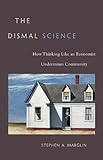The dismal science : how thinking like an economist undermines community / Stephen A. Marglin.
By: Marglin, Stephen A [author]
Language: English Publisher: Cambridge, Massachusetts : Harvard University Press, 2008Description: xvi, 359 pages ; 25 cmContent type: text Media type: unmediated Carrier type: volumeISBN: 9780674026544; 0674026543Other title: How thinking like an economist undermines communitySubject(s): Economics -- Sociological aspects | Markets -- Social aspects | Economic development -- Social aspects | Communities | Social structure -- Economic aspectsDDC classification: 306.3 LOC classification: HB724 | .M37 2008Online resources: Table of contents only| Item type | Current location | Home library | Call number | Status | Date due | Barcode | Item holds |
|---|---|---|---|---|---|---|---|
 BOOK
BOOK
|
COLLEGE LIBRARY | COLLEGE LIBRARY SUBJECT REFERENCE | 306.3 M337 2008 (Browse shelf) | Available | CITU-CL-43294 |
Includes index
Includes bibliographical references (p. 309-350)
Economics, the market, and community --
What is community? and is it worth the cost? --
The cutting edge of modernity --
Individualism --
Some history --
From vice to virtue in a century --
How do we know when we do not know? --
Sources of the modern ideology of knowledge --
Taking experience seriously --
Welfare economics and the nation-state --
Why is enough never enough? --
The economics of tragic choices --
From imperialism to globalization, by way of development --
Appendix A: The limits of dissent --
Appendix B: The distributional roots of the enclosure movement.
Marglin dissects the ways in which the foundational assumptions of economics justify a world in which individuals are isolated from one another and social connections are impoverished as people define themselves in terms of how much they can afford to consume. Over the last four centuries, this economic ideology has become the dominant ideology in much of the world. Marglin presents an account of how this happened and an argument for righting the imbalance in our lives that this ideology has fostered. [from publisher description].

There are no comments for this item.